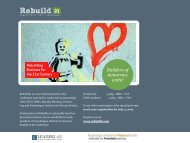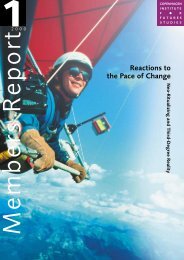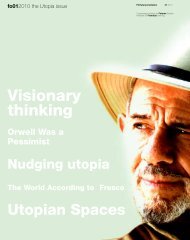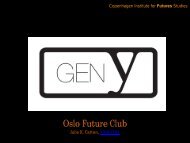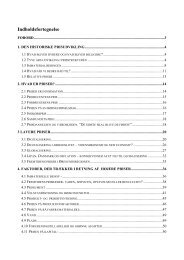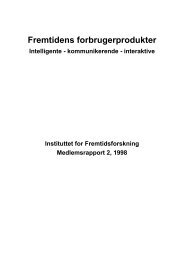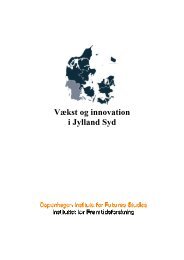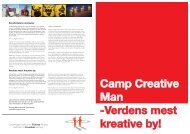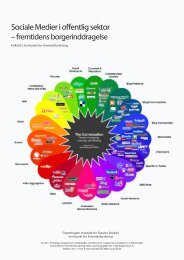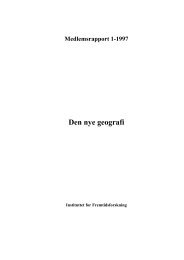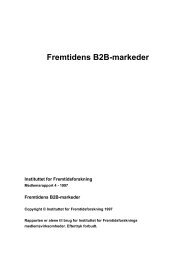Branding.
Branding.
Branding.
Create successful ePaper yourself
Turn your PDF publications into a flip-book with our unique Google optimized e-Paper software.
17<br />
ability of the individual and on the other hand converts the particular contributions<br />
to the benefit of the overall goals of the organisation.<br />
The most adaptable companies have succeeded in this. However, a number<br />
of employees still feel discontent with their work because their workplace<br />
hasn't managed to struggle free of historically-determined principles of<br />
organisation and development, including the idea of time as a measure of<br />
the amount of work. The most dynamic employees solve the problem by<br />
starting their own company or becoming free agents - the fastest growing<br />
group on the Scandinavian labour markets. Others instead use their energy<br />
on family life and association activities, where the opportunity for personal<br />
expression is far greater, or they periodically take on dull work in order to<br />
finance more pleasurable work that isn't profitable here and now - but<br />
always is con amore. Working life today has thus become polarised between<br />
dynamic, networking single-person companies - or larger companies that<br />
emulate this structure - and the more sluggish traditional companies.<br />
<strong>Branding</strong> in 'Create and Brand Yourself'<br />
The monolithic corporate branding (page 6) was around the turn of the millennium<br />
implemented in many companies. The inspiration came from the<br />
really big and global companies that long had used this tactic successfully.<br />
These megacorporations have continued to grow. The thesis that we one day<br />
would have between 500 and 1000 big and dominant commercial stories<br />
held true, and the logic from the book about the Dream Society can thus be<br />
said to have been implemented.<br />
The struggle for market shares has for these conglomerates become a<br />
struggle for stories. The megastories that have won are those that support<br />
the idea of the emotional individualist, and these have become carriers of<br />
culture. Many are stories that already at the turn of the millennium were<br />
favourite examples of management books, e.g. Nike (personal faith in progress),<br />
Marlboro (the personal outsider and rebellion against authorities) and<br />
Harley Davidson (freedom).<br />
"The perspective we see outlined<br />
is thus a future with perhaps 500<br />
or 1000 global suppliers, each<br />
with its own 'country' of stories.<br />
The strong stories can easily<br />
defend their borders while the<br />
weaker ones succumb. They get<br />
'invaded' and conquered by the<br />
stronger stories. The struggle for<br />
market shares becomes a struggle<br />
for stories."<br />
Rolf Jensen in The Dream Society<br />
The Copenhagen Institute for<br />
Futures Studies<br />
The big corporate story has lost<br />
But the big corporate story has still lost over a wide front, especially among<br />
the small and medium-sized companies, which on an international scale<br />
means most Scandinavian companies. The megastories are too strong. Only<br />
companies that have their alliances in place, their megaphones up and charged,<br />
and money enough to do the work properly, have a chance of getting<br />
into the struggle at the top.<br />
The situation is aggravated by the paradox that along with our propensity<br />
for megastories, we increasingly focus on our personal tale and our personal<br />
emotions, which over the years have made everything in between fairly<br />
uninteresting. The emotional and the immaterial may well be a strong driving<br />
force in society, but individualisation is stronger. Life isn't a theme park<br />
that we walk through as passive observers; life is an emotional and personal<br />
development that we like to influence ourselves.<br />
This means that the prefabricated dream, communicated by professional<br />
storytellers, will lose out to the individual's need to tell its own story through<br />
active contribution. The little emotional story wins.<br />
At the same time many companies experience that their values increasingly<br />
are seen as inconsequential. They have too high a level of abstraction and far<br />
too few common denominators to embrace and interest employees and other<br />
stakeholders. CSR (see page 7) is much less a topic than it used to be.<br />
Corporate branding is dying<br />
The idea of the all-embracing corporate brand has thus suffered serious damage




